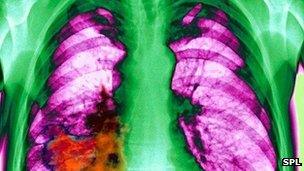'Rich-poor' cancer gap persists
- Published

Experts estimate, each year, more than 1,000 lung cancers could be diagnosed earlier
Each year 5,600 people in England miss out on having their cancer diagnosed at an earlier stage because of social inequalities, say experts.
The findings in Annals of Oncology show a gulf between the richest and poorest remains despite efforts to improve cancer awareness and access to care.
Much of the difference is due to delays in people recognising symptoms and then going to see a doctor, the Cambridge University team believe.
They analysed data on 98,942 patients.
Late diagnosis
They looked at 10 common cancers - breast, bowel, bladder, lung, prostate, womb, ovarian, skin, kidney and rectal - responsible for more than two-thirds of all new cancer diagnoses in England.
Patients living in poorer neighbourhoods in eastern England were less likely to have their cancers picked up early than those living in more affluent parts of this region.
As well as income, age, gender and type of cancer also played a role.
Men with skin cancer (melanoma) and lung cancer were more likely to have their disease diagnosed late than women with the same cancer.
Older patients were also more likely to be diagnosed at an advanced stage for breast, prostate, skin and womb cancer.
The researchers estimate that closing this gap could benefit, each year, 2,000 men with prostate cancer, 1,300 people with lung cancer, 1,000 women with breast cancer, 700 people with skin cancer, and 600 people with other types of cancer, who are currently diagnosed at a late stage.
Improvements
Lead researcher Dr Georgios Lyratzopoulos said: "We know that earlier stage diagnosis of cancer is important - it dramatically improves the effectiveness of treatment and survival for many cancers."
He said the findings highlighted which people would benefit most from targeted cancer awareness campaigns.
Sara Hiom, Cancer Research UK's director of information, said: "We must address the unacceptable health inequalities that still exist in this country."
Prof Sir Mike Richards, National Clinical Director for Cancer, said significantly more patients could be diagnosed at an early stage if inequalities could be tackled.
More than 250,000 people in England are diagnosed with cancer every year and about 130,000 die from the disease.
The government has set out an ambition to halve the gap between the survival rates in the best countries in Europe compared with the survival rates in England, by 2014-15.
It has run several cancer awareness activities, including national bowel and lung cancer campaigns, and provided a £600m fund to improve access to cancer drugs.
Cancer experts say death rates for many cancers look set to fall in coming years thanks to improvements in diagnosis and treatment.
- Published12 November 2012
- Published25 September 2012
- Published7 November 2012